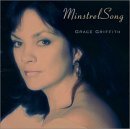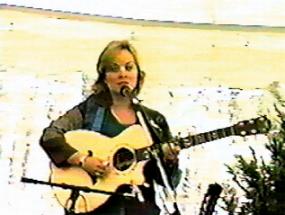January, 2003: Songwriter Steven Digman (“Anniversary Song,” etc.) originally wrote this article/interview for the Pickett News in Hagerstown, Maryland. Reprinted with permission of the author.
Music Reflections
By Digman
The Prologue: My original musical intention was to write a review on Eva Cassidy’s already much reviewed CD “Imagine”. The difficulty is, what can you say (write) about this Late Great Maryland Artist that hasn’t been said (written) about before. Reading the liner notes written by Bill Straw (the founder of Blix Street Records), I noticed that the first name mentioned was not the name Eva Cassidy, but the name – Grace Griffith.

Why?
So I asked Grace Griffith, and her answer was not only eloquent in words of beauty, poetry and praise, but was so thought-provoking as to leave me… ‘Writeless’! Needless to say (write), this will no longer be a review of “Imagine” but it will be one more answer in the legacy (story) …of The Late Great Eva Cassidy. In her words:
 Things were looking good for me in the mid-nineties in the music career direction. The independent record label which had established one of Ireland’s most famous and successful singers, Mary Black, had signed me to a multiple album deal and my horizons were looking bright. Furthermore, I was performing regularly, something which I truly love to do for the feeling of connection with the audience I get and the way the music can seem to make things better somehow.
Things were looking good for me in the mid-nineties in the music career direction. The independent record label which had established one of Ireland’s most famous and successful singers, Mary Black, had signed me to a multiple album deal and my horizons were looking bright. Furthermore, I was performing regularly, something which I truly love to do for the feeling of connection with the audience I get and the way the music can seem to make things better somehow.
I had been hearing occasionally about a local singer Eva Cassidy who, in my husband’s lingo, could “really wail”. I was intrigued to realize I had been seeing her face in my audience occasionally over the years — Eva had a very arresting face of striking beauty, with amazing eyes like blue fire — you would notice it. When I had extended friendly greetings to her on my break, or passing on an escalator or amidst the conversation-killing din of a WAMA awards ceremony, she had seemed more than a bit reserved — downright bashful.
So finally one July night (the year she died — I’m terrible with dates) I had an idle evening on hand and I saw she was playing in Old Town at 214 and I took myself down to hear her. She totally blew me away. All the colors of the rainbow, all life’s palette of beauty and sadness and sweet passion and eternity — it was all there in that voice that came from that heart and those hands.
She was limping that night — apparently thought she’d pulled some hip muscles lifting an amp or something. She was obviously in pain but she put on one hell of a show — understated without flashiness, just pure beauty and the most amazing voice I’d ever heard. I went up to her on a break and blathered something about her wonderfulness and ‘I really mean it, you’re the greatest singer I’ve ever heard,’ and still she seemed shy and kind of removed. Chris (Biondo), her bass player (also her producer and friend) approached me and said that I should know she was terrified of me, that she was too shy to talk to me because she thought I was so great — she was a huge fan.
I went home that night happy at the idea maybe we would get to know each other as friends, and looking forward to hearing more of Eva Cassidy. Shortly after that I took some family and friends to see her at Blues Alley and she had the same effect on everyone at the table.
It was soon after that I had a message on my answering machine from her mother, Barbara, who I had never met. The voice said Eva was very very ill, and it was very sad, and she knew Eva loved my singing and would like me to come sing with her. That limp she’d had wasn’t from lifting an amp — it was a pathological hip fracture from cancer and it was going to take her life and she knew her prognosis.
Even as weak as she was then, using a wheelchair to come out to the living room so we could share some songs with her brother (Dan Cassidy) visiting from Iceland, and my friend Marcy Marxer who came with me, Eva could still sing like a nightingale, and we had some real fun harmonies going. She asked for Scottish songs, and folk songs about nature, and expressed some ruefulness she hadn’t done more of that sort of thing in her own repertoire. She and her dad talked about some of her frustration with the business side of music and how people kept trying to pigeonhole her to fit some recording industry category and she couldn’t get signed to a label.
Well, I had mentioned Eva to Bill Straw a while back, and had been debating sending them some of her stuff to hear. My debate was between my better self and my ? less-than-better self. The better self was inclined to pass her beautiful music along regardless of any potential cost to my own position, because beauty should be shared. The less-than-better self was voicing concern that I might be shooting myself in the foot by making my record label aware of an artist of such caliber — I have often been accused of not being competitive enough in a competitive world, and I was thinking twice about this one. But I am a person who must follow a certain way to be comfortable in my own skin. I put a tape of Live at Blues Alley in the mail to Blix Street Records the next day. I put ‘Fields of Gold’ first on that tape because it was the most powerfully affecting cut of the bunch, to my ear.
 At the memorial service for Eva at Greenbelt Park, singer Grace Griffith performed a haunting Celtic-tinged version of “Golden Thread” that Eva would have loved. |
I guess the rest is history. ‘Fields of Gold’ was the first big hit in what has become a phenomenal posthumous career.
Now as I reflect back on that sequence of events I’m struck by the good fortune that has come to me indirectly through Eva, which would not be so had I let my less-than-better self prevail in my debate about introducing Eva’s work to Blix Street Records.
The sequel, the unforeseen bend in the road, came in 1998, when I received a diagnosis of Parkinson’s Disease. This life-changing degenerative illness has gotten publicity in recent years as the affliction from which Michael J. Fox suffers. Like many neurological illnesses PD symptoms vary from one patient to another, but stamina usually gets up and goes, and mine has got up and went. I have really had to cut back on the pace of my life. I think in most cases this would be the kiss of death for an artist in a competitive industry like music, and independent record labels generally need artists who can actively and aggressively help promote their work through touring and other means.
But Eva helps me. The great success of her recordings has put Blix Street in a position such that they can keep me in their ‘stable’ and be supportive of my recording work even though I can only do it on a limited basis, without tight timeframes or a vigorous performing schedule. I feel like my kindness to Eva is being returned every day.
Also seeing how much beauty Eva wrought in her short time inspires me to be encouraged by how much can be found in a single moment if we listen and look and savor. This comforts me as I learn to live with fewer good moments in a day. I wish her success could have happened for her while she was alive. I wish we got to sing again. We would have had some great walks.
Blix Street Records deserves commendation for taking a chance on an artist who wouldn’t be pigeonholed and wouldn’t be able to promote her work — Eva Cassidy. I consider myself very fortunate to be part of this circle.
…And it is my hope that now the reader will join this circle and become a listener to both wonderful artists: Grace Griffith and the Late Great Eva Cassidy.